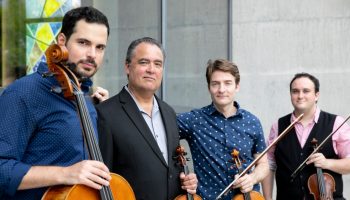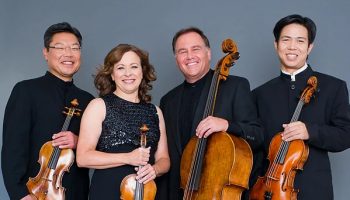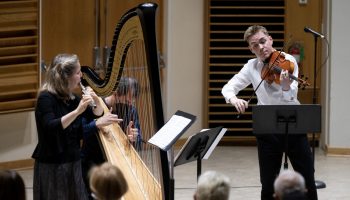While clarinetist Mark Dover was still a college student, he heard Imani Winds perform and became a big fan. After he graduated from the Manhattan School of Music with his master’s in music, he auditioned for the wind quintet.
“I didn’t think I was going to get the job. They were a little bit late in letting me know,” Dover said.
Finally, two days after Christmas — on his wife’s birthday — he got the call from Imani Winds, letting him know he was officially a part of the group.
“I was just very surprised,” he said. “(It was) probably one of the happier days of my life, along with my wedding day and my daughter being born. It was definitely up there.”
Imani Winds, which includes flutist Brandon Patrick George, oboist Toyin Spellman-Diaz, French horn player Kevin Newton, bassoonist Monica Ellis and clarinetist Dover, will take the stage at 4 p.m. Monday, Aug. 1 in Elizabeth S. Lenna Hall for the 2022 Chautauqua Chamber Music Guest Artist Series. Mask are required for audience members.
The group’s latest album, Bruits, was nominated for a 2022 Grammy in the category “Best Chamber Music/Small Ensemble Performance,” and in 2016, they were a part of an exhibition about Black musicians’ contributions to classical music in the Smithsonian’s National Museum of African American History and Culture.
Imani Winds is dedicated to more than making great music; they also want to make great musicians, and music education is an inseparable aspect of the group’s work. From the birth of the ensemble in 1997, members knew outreach through music education was important to them, Dover said.
“We always do outreach wherever we go,” he said. “If we are playing a chamber music society, we will do an outreach concert … that the chamber music society helps organize, or we will go to a university and we’ll work with students there.”
Even though music education is the group’s mission as a whole, it is still equally personal and special to each of the members individually.
“It’s everything. I wouldn’t be here without the training that I received and the teachers that I’ve had,” Dover said.
People fear that there’s a declining interest in classical music, and Dover thinks the solution is making classical music accessible to everyone.
“It all comes down to the root, the source, which is the schools and music education, and being able to provide instruments and instruction for anyone who wants it,” he said.
Another project that Imani Winds maintains is its Legacy Commissioning Project. Through this project, it commissions wind ensemble pieces from composers who are underrepresented in classical music.
“It’s the lifeblood of the group,” Dover said. “I’m into the idea of always looking to perform new works and celebrating living, breathing composers, and then also composers of color, women composers. I think that, for all of us, that’s right up there at the top of the ongoing projects that we are really committed to.”
For the music they will perform this afternoon, Dover dubbed the unofficial theme of the concert “Considered Modern 2.0.”
The modern music on the ensemble’s program is Eugene Bozza’s Scherzo, Elliott Carter’s Woodwind Quintet, Henri Tomasi’s “Cinq Danses Profanes et Sacrées,” Valerie Coleman’s Afro-Cuban Concerto and Paquito D’Rivera’s “Wapango.”
“Some of the works on the program are a little bit older, but in terms of the grander scheme of 20th-century works, we really feel that these are all 20th- and 21st-century works that really represent the sound of the wind quintet and the kind of music that we really believe in,” Dover said. “And it’s just a lot of fun.”
The third piece, Valeria Coleman’s Afro-Cuban Concerto, is particularly special to Imani Winds because Coleman used to be a member of the group.
While writing a piece for orchestra, the commission fell through. Luckily, instead of abandoning the piece, Coleman made the music into a piece for a wind quintet, specifically Imani Winds.
“She put all of the orchestra parts and the solo parts into the quintet,” Dover said. “It’s a really cool piece that has a very Afro-Cuban feel to it. Each movement has a different type of rhythmic feel, a different type of dance. It’s very improvisatory.”
Playing music like Coleman’s reminds the artists of the history of Imani Winds, which existed for years before any of the current members joined.
“You’re caught between having all this reverence and respect for the group, and how do you channel that through your own instrument and through your own voice?” Dover said. “For me, it’s more about continuing their legacy and trying to put my own passion into it — trying to give Imani Winds what it deserves and what it already was, and just taking that and then rolling with it.”




